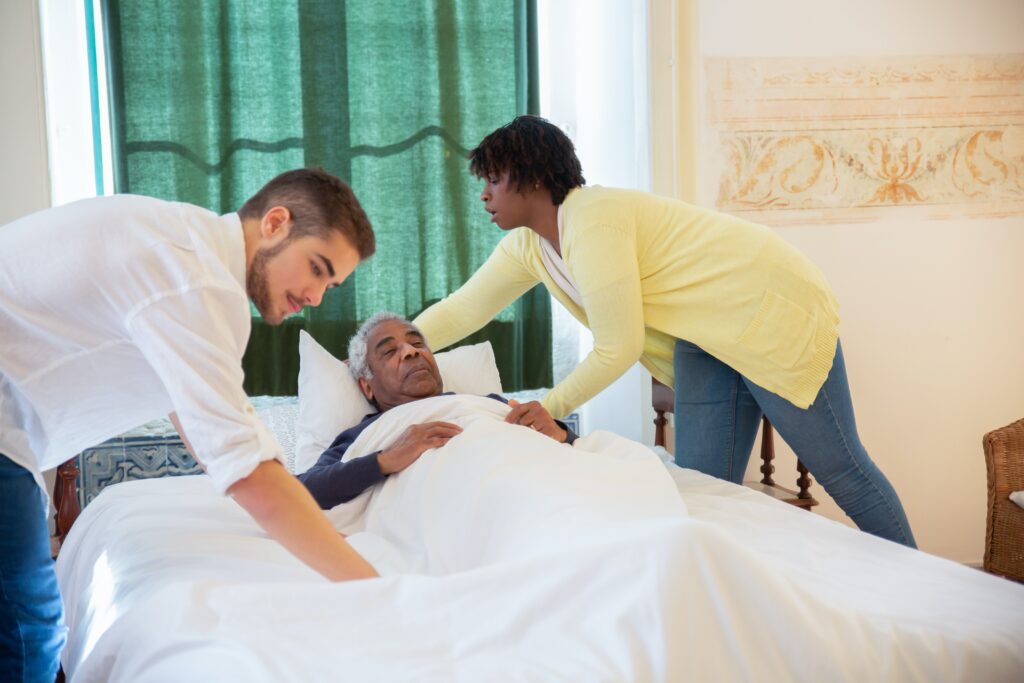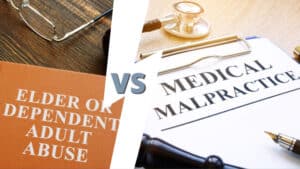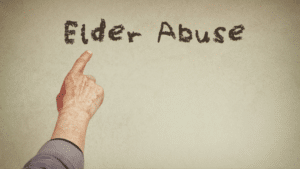Elder Abuse Law Firm: Identify, Prevent & Stop Elder Abuse
While many dedicated professionals work at residential care facilities for seniors, elder abuse and elder neglect is on the rise. In the case of nursing homes and senior care facilities, the motive of increasing profit often accompanies a greater risk of injury or exploitation of elder and dependent adults.
Below you will find questions and answers to key questions on California law to protect the elderly and disabled people from neglect. If you do not see an answer to one of your questions, or wish for one of experienced elder abuse attorneys to review your case or that of a family member, please complete our contact form or call us toll free at 1-888-452-4752. There is no charge or obligation for our review your case.
Who Is Protected Under California Law From Elder Abuse And Neglect?
California law protects elders, dependent adults, and developmentally disabled person from many types of abuse and neglect.
An “elder” is anyone within California who is 65 years of age or older.
A “dependent adult” is any person between the ages of 18 and 64 who resides in California and who has physical or mental limitations that restrict his or her ability to carry out normal activities or to protect his or her rights. A dependent adult also includes any person who is admitted as an inpatient to a 24-hour health care facility. This may include the elderly, those suffering dementia, the developmentally disabled, the brain injured, psychiatric patients and, in some instances, those in rehabilitation facilities.
A “developmentally disabled person” is any person with a disability that originates before an individual reaches age 18, continues, or can be expected to continue, indefinitely and constitutes a substantial disability for that person. This may include persons with cerebral palsy, epilepsy, and autism.
What is Elder Abuse?
Abuse of of an elder or dependent adult can be:
- Abandonment (desertion of an elder by his/her caregiver),
- Abduction (removal from and/or restraint outside of California),
- Financial abuse (illegal or unethical exploitation or use of elder’s assets, funds and/or property),
- Isolation (intentional prevention of an elder from communicating with others),
- Neglect (failure by caretakers to perform duties and obligations relating to elder’s health and welfare),
- Physical abuse (infliction of physical pain or suffering including use of physical restraints and prescription drugs to control and punish), or
- Other treatment that causes physical harm or pain or mental suffering.
In addition, the denial by a care custodian of goods or services necessary to avoid physical harm or mental suffering constitutes elder abuse under California law. Care custodians are administrators or employees of any facility proving care or services for elders or dependent adults.
Warning Signs Of Elder Abuse And Nursing Home Neglect
- Bedsores: also called pressure sores or press ulcers, injuries to skin and underlying tissue resulting from prolonged pressure on the skin. Most often develop on skin that covers bony areas of the body, such as the heels, ankles, hips and tailbone.
- Bruises, scratches, blisters, and pinch marks.
- Burns caused by ropes, restraints or scalding water.
- Failure to change sheets, undergarments and bandages.
- Financial exploitation and fraud.
- Foul smelling, unchanged diapers and/or bed sheets.
- Improper restraints resulting in injuries with an outline on the body.
- Lack of supervision that leads to falls and injuries from falling.
- Malnourishment or dehydration.
- Overmedication: excessive use of antipsychotics, sedatives and other prescription drugs to “chemically restrain” or punish.
- Poor hygiene including unwashed, uncombed or matted hair, unkept appearance, poor skin condition, and untrimmed nails.
- Refusal to answer calls for reasonable requests for assistance, such as helping the senior rise from bed to use the bathroom.
- Repeated injuries inconsistent with explanations.
- Sexual assault.
- Stealing property, money and checks.
- Untreated medical conditions.
What Steps Should Be Taken Immediately If You Suspect Elder Abuse?
If you suspect elder abuse, don’t hesitate to take action. Approximately 1 in 10 Americans aged 60+ have experienced some form of elder abuse according to the National Center on Elder Abuse. One study found that only 1 in 14 cases of elder abuse are ever reported.
- If the senior is in immediate danger from physical abuse or has been physically abused, call 9-1-1. Elder abuse is a crime.
- Take action so that elder abuse is reported, and appropriate civil and criminal ramifications imposed.
For local reporting agencies call the Eldercare Locator at 1-800-677-1116 or visit their website at www.eldercare.gov. Reporting agencies may include the State Department of Social Services, the State Department of Health Services (nursing home complaint division), county Adult Protective Services (APS) and county ombudsmans.
When you call to report Elder Abuse be prepared to with the following information: elder’s name, address, and contact information, the type of support received by the elder (family, medical, social care, etc.) and details of the type of elder abuse and who the abuser is.
- It is critical to document the senior’s physical condition as much as possible as well as his/her living conditions. Take photographs of the victim and room/housing. Record in a notebook or computer unsanitary conditions, poor hygiene, bedsores, physical abuse and improper restraints.
- If possible make formal complaints to facility supervisors. Document the dates you called, who you spoke with and what the response was. Keep copies of all correspondence.
Contact A San Francisco Elder Abuse Attorney At The Dolan Law Firm
Once you address the senior’s immediate safety and health care needs, you will rightly be upset at how your loved one was treated. You need to take action. California law provides for the recovery of damages for pain and suffering, economic damages, and punitive damages when there has been recklessness, fraud and/or patient abandonment.
We are leaders in the plaintiffs’ bar in representing individuals and their families subjected to elder abuse and neglect at senior, assisted living and nursing homes. We represent clients from San Francisco, Oakland, the entire Bay Area and across California. Please contact us online or call us toll free at 1-888-452-4752.
Additional Resources: Stop Elder Abuse Guide And California Nursing Home Patients Bill Of Rights
We want to empower all seniors and their families to identify, prevent and stop elder abuse. What constitutes elder abuse and neglect under California law? How can elder abuse be stopped? What are rights of patients in nursing homes and other senior facilities? These some of the questions we answer in a comprehensive booklet we wrote on this topic. You can download it by clicking here.
In recognition of the vulnerability of elders and dependent adults in California, the Legislature has mandated that all nursing homes provide residents a written policy, entitled “Nursing Home Resident’s Bill of Rights.” The law mandates that residents are entitled to privacy, dignity, and respect and that they can: choose their own physician, possess personal property, plan medical care, manage their own finances, determine which visitors they may receive, and be discharged or transferred only for medical reasons.
Patients shall have the right:
(1) To be fully informed, as evidenced by the patient’s written acknowledgment prior to or at the time of admission and during stay, of these rights and of all rules and regulations governing patient conduct.
(2) To be fully informed, prior to or at the time of admission and during stay, of services available in the facility and of related charges, including any charges for services not covered by the facilities’ basic per diem rate or not covered under Title XVIII or XIX of the Social Security Act.
(3) To be fully informed by a physician of his or her total health status and to be afforded the opportunity to participate on an immediate and ongoing basis in the total plan of care including the identification of medical, nursing, and psychosocial needs and the planning of related services.
(4) To consent to or to refuse any treatment or procedure or participation in experimental research.
(5) To receive all information that is material to an individual patient’s decision concerning whether to accept or refuse any proposed treatment or procedure. The disclosure of material information for administration of psychotherapeutic drugs or physical restraints, or the prolonged use of a device that may lead to the inability to regain use of a normal bodily function shall include the disclosure of information listed in Section 73524(c).
(6) To be transferred or discharged only for medical reasons, or the patient’s welfare or that of other patients or for nonpayment for his or her stay and to be given reasonable advance notice to ensure orderly transfer or discharge. Such actions shall be documented in the patient’s health record.
(7) To be encouraged and assisted throughout the period of stay to exercise rights as a patient and as a citizen, and to this end to voice grievances and recommend changes in policies and services to facility staff and/or outside representatives of the patient’s choice, free from restraint, interference, coercion, discrimination or reprisal.
(8) To manage personal financial affairs, or to be given at least a quarterly accounting of financial transactions made on the patient’s behalf should the facility accept his or her written delegation of this responsibility subject to the provisions of Section 73557.
(9) To be free from mental and physical abuse.
(10) To be assured confidential treatment of financial and health records and to approve or refuse their release, except as authorized by law.
(11) To be treated with consideration, respect and full recognition of dignity and individuality, including privacy in treatment and in care for personal needs.
(12) To be free from discrimination based on sex, race, color, religion, ancestry, national origin, sexual orientation, disability, medical condition, marital status, or registered domestic partner status.
(13) Not to be required to perform services for the facility that are not included for therapeutic purposes in the patient’s plan of care.
(14) To associate and communicate privately with persons of the patient’s choice, and to send and receive his or her personal mail unopened.
(15) To meet with and participate in activities of social, religious and community groups at the patient’s discretion.
(16) To retain and use his or her personal clothing and possessions as space permits, unless to do so would infringe upon the health, safety or rights of the patient or other patients.
(17) If married or registered as a domestic partner, to be assured privacy for visits by the patient’s spouse or registered domestic partner and if both are patients in the facility, to be permitted to share a room.
(18) To have daily visiting hours established.
(19) To have visits from members of the clergy at the request of the patient or the patient’s representative.
(20) To have visits from persons of the patient’s choosing at any time if the patient is critically ill, unless medically contraindicated.
(21) To be allowed privacy for visits with family, friends, clergy, social workers or for professional or business purposes.
(22) To have reasonable access to telephones both to make and receive confidential calls.
(23) To be free from any requirement to purchase drugs or rent or purchase medical supplies or equipment from any particular source in accordance with the provisions of Section 1320 of the Health and Safety Code.
(24) To be free from psychotherapeutic and/or physical restraints used for the purpose of patient discipline or staff convenience and to be free from psychotherapeutic drugs used as a chemical restraint as defined in Section 73012, except in an emergency which threatens to bring immediate injury to the patient or others. If a chemical restraint is administered during an emergency, such medication shall be only that which is required to treat the emergency condition and shall be provided in ways that are least restrictive of the personal liberty of the patient and used only for a specified and limited period of time.
(25) Other rights as specified in Health and Safety Code Section 1599.1.
(26) Other rights as specified in Welfare and Institutions Code Sections 5325 and 5325.1 for persons admitted for psychiatric evaluations or treatment.
(27) Other rights as specified in Welfare and Institutions Code, Sections 4502, 4503 and 4505 for patients who are developmentally disabled as defined in Section 4512 of the Welfare and Institutions Code.














